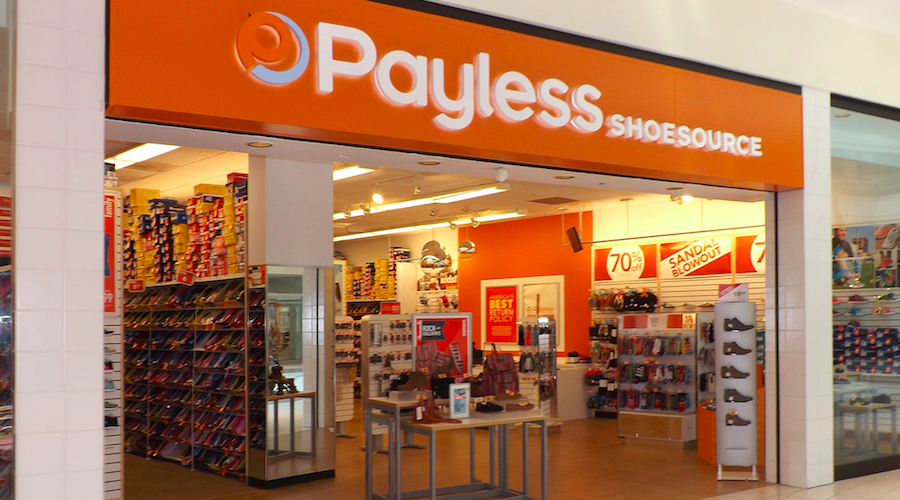Payless ShoeSource filed a bankruptcy petition with an immediate plan to close 400 locations in the U.S. and Puerto Rico and an overall goal to reduce its debt load by almost 50 percent.
The filing Tuesday in St. Louis bankruptcy court listed liabilities between $1 billion and $10 billion. The largest unsecured creditor was Morgan Stanley Senior Funding Inc. with a contested claim of $145 million. Most of the top-50 unsecured creditors were international importers as most of the budget shoe retailer’s products are private label.
Among the U.S. firms left with unsecured claims were Fila USA, New York, NY, owed $5.17 million, as well as two licensing partners, Champion Athleticwear, Winston-Salem, NC, owed $1.41 million; and E.S. Originals, New York, NY, owed $1.25 million.
Its core athletic brands include Airwalk, Champion and Kangaroo under license, as well as a proprietary brands: Cross Trekkers, American Eagle and Brash.
In a statement, Payless said in conjunction with the restructuring, it has entered into a Plan Support Agreement (PSA) with parties who hold or control approximately 2/3 of its first lien and second lien term debt to reduce its debt load by almost 50 percent, materially lower its annual cash interest costs, access significant additional capital and provide a path to an expedited emergence from Chapter 11 with a sustainable capital structure for the future.
“The PSA demonstrates the strong support of our senior lenders for a consensual restructuring and their conviction in the future of Payless, as well as providing a clear path to emergence on an expedited basis,” Payless said.
Under the agreed plan with lenders, Payless intends to use the Chapter 11 process to accomplish three objectives:
- Strengthen its balance sheet and restructure Payless’ debt load;
- Invest in specific areas that Payless believes will provide sustainable growth including omnichannel expansion; product and inventory initiatives; and international expansion in Latin America and elsewhere;
- Optimize its store footprint, with the immediate closure of nearly 400 underperforming locations in the U.S. and Puerto Rico and work to aggressively manage the remaining real estate lease portfolio either by modifying terms, or evaluating closures of additional locations.
Billing itself as “the largest specialty family footwear retailer in the Western Hemisphere,” Payless has approximately 4,400 stores in more than 30 countries.
“This is a difficult, but necessary, decision driven by the continued challenges of the retail environment, which will only intensify,” said Paul Jones, Payless CEO. “We will build a stronger Payless for our customers, vendors and suppliers, associates, business partners and other stakeholders through this process. While we have had to make many tough choices, we appreciate the substantial support we have received from our lenders, who share our belief that we have a unique opportunity to enable Payless — the iconic American footwear retailer with one of the best-recognized global brands — to remain the go-to shoe store for customers in America and around the globe.”
Payless said it has negotiated agreements with certain of its existing lenders to provide Payless access of up to $385 million of debtor-in-possession (DIP) financing, which includes access to $305 million of ABL financing and up to $80 million of new term loan financing. In total, the DIP financing will provide Payless with access to up to $120 million in incremental liquidity during the Chapter 11 cases.
The retailer, based in Topeka, KS, said the incremental liquidity will ensure that suppliers and other business partners/vendors will be paid in a timely manner for authorized goods and services provided during the Chapter 11 process, in accordance with customary terms. The $80 million of new term loan financing will also ensure the company has the exit financing required to emerge from Chapter 11 well positioned for future growth and profitability post-restructuring.
“We are confident that this process will also enable us to leverage Payless’s existing strengths to succeed,” continued Jones. “These strengths include our ability to produce significant free cash flow and, even last year, flat EBITDA despite unprecedented challenges and in contrast to many retailers; our portfolio of strong proprietary brands, along with unique licensing agreements with premier brands and partners; our best-in-class design and sourcing capabilities that enable the Company to offer customers high quality products at a significant discount to peers; our strong and growing Latin American business, and a lean and scalable franchise model for other markets.”
In the weeks before the filing, reports arrived that Payless was considering closing as many as 500 locations in a bankruptcy restructuring.
Payless has a $520 million term loan due in 2021 and a $145 million loan maturing the following year, according to data compiled by Bloomberg. In February, the retailer’s debt was downgraded by both Moody’s Investors Service and Standard & Poor’s due to eroding revenues and its upcoming debt obligations.
The chain has been owned by private-equity firms Golden Gate Capital and Blum Capital Partners it was spun-off from Collective Brands Inc. in 2012. Collective Brands had also owned Saucony, Keds, Sperry and Stride Rite.
Foreign trade suppliers landing among the top-20 unsecured creditors included Ever-Rite International Co Ltd., New Taipei City, Taiwan, owed $23.3 million; Huge International Ltd, Taichung City, Taiwan, $18.2 million; The Asean Corp Ltd, Kowloon, Hong Kong, $13.9 million; Qingdao Doublestar Mingren Imp & Exp Co, Shandong, China, $8.7 million; Fortune Way International Co. Ltd, Taichung, Taiwan, $7.9 million; Xiamen C And D Light Industry Co Ltd., Fujian, China, $5.6 million; Santak Corporation, Taichung, Taiwan, $5.6 million; Highcom International Limited, Taichung, Taiwan, $5.5 million; Best Paramount International Limited, Taipei, Taiwan, $4.9 million; Tcfe International Co., Ltd., Fujian, China, $4.7 million; Putian City Hui Sheng Trading Co Ltd, Fujian China, $4.0 million; Topsmart International Co., Ltd., Guangdong, China, $3.9 million; C & C Accord Ltd, Taichung, Taiwan, $3.6 million; Ascendant (Hong Kong) Trade Co Limited, Kowloon, Hong Kong, $3.6 million; Mia Worldwide Co Ltd, Taichung City, Taiwan, $3.5 million; Dongyi Shoes Co Ltd, Wenzhou, China, $3.2 million; and Glory China Footwear Co Ltd., Fujian, China, $2.9 million.
Other U.S. firms caught with unpaid bills in the bankruptcy included Moda Shoe Limited, El Segundo, CA, owed $14.9 million; Kenth Productions LLC, New York, NY, $2.5 million; Peds Legwear USA Inc., Hildebran, NC, $2.2 million; Everything Legwear LLC, Dallas, TX, $1.98 million; Shi International Corp, Somerset, NJ, $1.83 million; Topline Imports Inc., Long Island City, NY, $1.23 million; U.S. Continental Marketing Inc., Corona, CA, $1.15 million; Interloop Limited, Winston-Salem, NC, $1.15 million; Inter-Pacific Corp, Los Angeles, CA, $1.12 million; and Santana Shoes, El Segundo, CA, $997,825.
Photo courtesy Payless ShoeSource
















